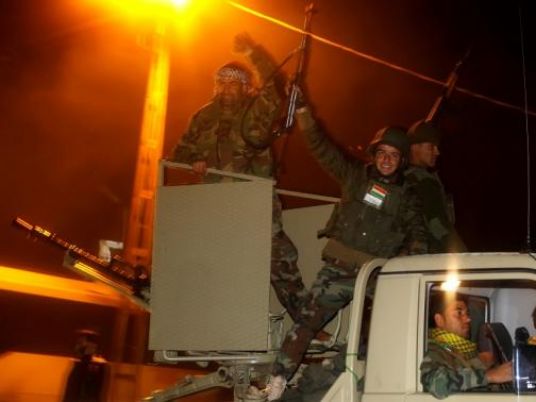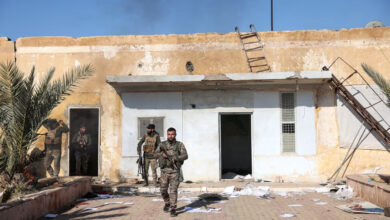
Iraqi Kurdish forces arrived in the Syrian town of Kobani with heavy weapons to help Syrian Kurds fend off attempts by Islamic State insurgents to seize the town and cement control in the Turkish border region.
Syrian Kurdish fighters welcomed the fighters who are known as peshmerga or "those who defy death", and said that with the weapons they had brought with them, they could help tip the balance in a battle raging for more than 40 days.
The peshmerga are expected to take part in the military action in Kobani in the next few hours, Kurdish officials said.
"What was lacking is the weapons and ammunition, so the arrival of more of it plus the fighters will help tip the balance of the battle," Idris Nassan, deputy foreign minister of Kobani district, told Reuters by telephone from Kobani.
"The whole issue is the weapons and ammunition, of course more fighters will help."
At least one U.S.-led air strike hit Islamic State positions around Kobani on Saturday, he said. "The sun is shining and the sky is clear so the warplanes can actively work today."
The arrival of the 150 Iraqi fighters would mark the first time Turkey has allowed ground troops from outside Syria to reinforce Syrian Kurds, who have been defending Kobani for more than 40 days.
Despite having limited strategic significance, Kobani has become a powerful international symbol in the battle against the hardline Sunni Muslim insurgents who have captured large expanses of Iraq and Syria and declared an Islamic "caliphate".
GETTING READY FOR THE FIGHT
Kurdish officials in the town of Kobani said that the peshmerga were not involved in fighting which took place on Friday night but they were getting ready to participate in battles on Saturday.
"Right now the peshmerga are making preparations. They are taking up their positions, preparing their guns and are ready for combat. They will be fighting today at the front," said Enver Muslim, the top Kurdish administrative official in the Kobani district, told Reuters by telephone from the town.
"Everyone here, civilians, the YPG (the main Syrian Kurdish armed group defending the town), we are all in very good spirits after their arrival."
The U.S. military said it continued to target Islamic State militants near Kobani on Thursday and Friday. It said four air strikes damaged four fighting positions used by the militant group as well as one of its buildings.
The Britain-based Syrian Observatory for Human Rights said at least 100 Islamic State fighters were killed in the past three days.
Iraqi peshmerga were not the only group to enter the Kurdish town. Around 200 fighters from the Free Syrian Army (FSA), a term used to refer to dozens of armed groups fighting against both Syrian President Bashar al-Assad and Islamic State, have also arrived in Kobani to help defend the town.
But the FSA move drew criticism from Syrian opposition activists who urged the fighters to deploy on fronts where the Western-backed rebels were losing to Assad and Islamist groups.
On Saturday, Syria's al-Qaeda linked Nusra Front seized Jabal al-Zawiya region, the last remaining stronghold of Western-backed rebels in Syria's northwest province of Idlib after days of fighting.
Backed by other hardline Islamist groups, the Nusra Front are waging a major military campaign against the Syria Revolutionaries' Front led by Jamal Maarouf, a key figure in the armed opposition to Assad, after accusing him of being corrupt and working for the West against them.
Sources said that dozens of Maarouf fighters defected to Nusra allowing the group to win. But Maarouf remained defiant and in a video message broadcast after he withdrew from Jabal al-Zawiya, vowed to continue the fight.
STAND UP FOR KOBANI
The Kobani battle has raged in full view of the Turkish frontier, testing whether a U.S.-led coalition can halt Islamic State's advance. The failure of Turkey to help defend the town sparked riots among Turkish Kurds in which 40 people died.
In a Turkish village near the border, thousands of people, took part in protests planned by Kurds across Turkey and elsewhere in solidarity with Kobani.
Many protesters waved flags with the insignia of the YPG and the face of Abdullah Ocalan, jailed leader of the outlawed Kurdistan Workers Party (PKK).
"Today, the whole world is going to stand up for Kobani and embrace our fight there in democratic protests," Feleknas Uca, a German-Kurdish politician, told Reuters.
"Everyone should understand that Kobani is not a problem of the Kurds only. This is a global war against Islamic State."
Armored vehicles were deployed on the streets of Diyarbakir, the largest city in mainly Kurdish southeast, as part of tight security measures ahead of the protests.
In the southeastern province of Hakkari, bordering Iraq and Iran, shopkeepers shuttered their shops as part of the protest.




